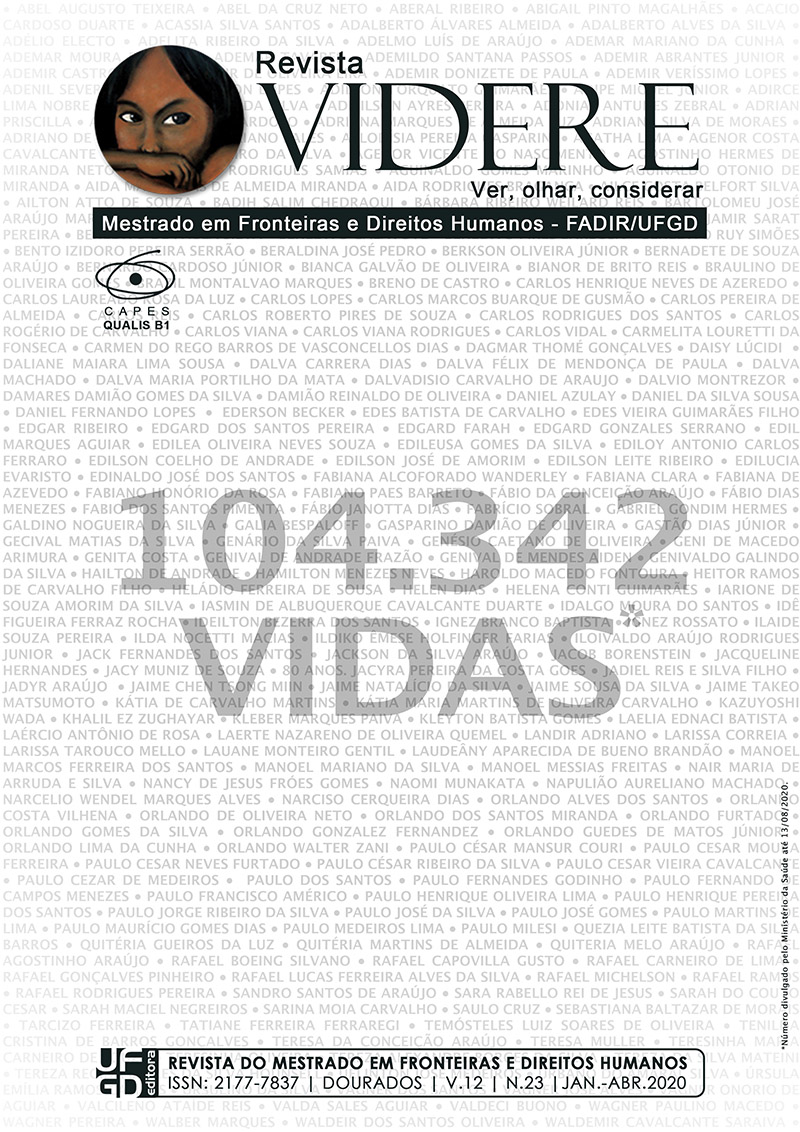Asylum paradoxes and resettlement as a durable solution
DOI:
https://doi.org/10.30612/videre.v12i23.11117Keywords:
Refugee. Durable Solutions. Resettlement.Abstract
This research deals with the institute of asylum and durable solutions, in particular, the resettlement of refugees. The asylum was institutionalized in the 50s, but, nowadays, there are new factors that generate flows of people outside their countries of origin. Taking into account the non-specific situation of the asylum, durable solutions were created, namely, voluntary repatriation, local integration and resettlement. The solutions are, precisely, a way to continue the life of the refugee, regardless of where they are. Resettlement is the solution that deals with the most vulnerable refugees, as they flee their state and, also, the first host state. In order to analyze the non-punctual situation of the asylum and the role of resettlement, the deductive method is used, using bibliographic and documentary material. Resettlement is an important solution for refugees who are at risk in the host country and is a viable option when other solutions cannot be implemented, as can be seen in the program implemented in Latin America. However, the solution still presents long-term challenges.Downloads
References
ACNUR. Global Trends: forced displacement in 2018. Geneva: ACNUR. 2019. Disponível em: https://www.unhcr.org/5d08d7ee7.pdf. Acesso em: 04 jan. 2020.
ACNUR. Memória do trigésimo aniversário da Declaração de Cartagena sobre refugiados. Quito: ACNUR. 2015. Disponível em: https://www.acnur.org/portugues/wp-content/uploads/2018/02/Mem%C3%B3rias-do-Trig%C3%A9simo-Anivers%C3%A1rio-da-Declara%C3%A7%C3%A3o-de-Cartagena-sobre-refugiados_ACNUR2015.pdf. Acesso em: 04 jan. 2020
ANDRADE, José H. Fischel. Direito internacional dos refugiados: evolução histórica (1921-1952). Rio de Janeiro: Renovar, 1996.
ANDRADE, José H. Fischel. A política de proteção a refugiados da organização das Nações Unidas – sua gênese no período pós-guerra (1946-1952). 327 f. Tese (Doutorado) – Universidade de Brasília, Instituto de Relações Internacionais, Brasília. 2006.
ARENDT, Hannah. Origens do totalitarismo. Trad. Roberto Raposo. São Paulo: Companhia das Letras, 1998.
CANÇADO-TRINDADE, Antônio Augusto. Tratado de direito internacional dos direitos humanos - v.1. Porto Alegre: Sergio Antonio Fabris, 2003.
FONSECA, Márcio Alves da. Imigração, Estado de Direito e biopolítica. Revista de Filosofia Aurora, v. 28, n. 45, p. 969-984, set./dez, 2016.
GUERRA, Sidney. Direitos humanos: curso elementar. São Paulo: Saraiva, 2017.
JUBILUT, Liliana Lyra; APOLINÁRIO, Silvia Menicucci O. S. A necessidade de proteção internacional no âmbito da migração. Revista Direito GV, v. 6, n. 1, p. 275-294, jan./jun., 2010.
JUBILUT, Liliana Lyra. O direito internacional dos refugiados e sua aplicação no ordenamento jurídico brasileiro. São Paulo: Método, 2007.
LAFER, Celso. Declaração Universal dos Direitos Humanos (1948). In: MAGNOLI, Demétrio (Org.). História da paz. São Paulo: Contexto, 2008, p. 297-329.
MARCOGLIESE, María José. The Solidarity Resettlement Programme, and alternatives, in Latin America. Forced Migration Review. Oxford, n. 54, February, 2017.
MIGRAÇÃO. In: OIM. Glossário sobre migrações - n. 22. Genebra: OIM, 2009. Disponível em: https://publications.iom.int/system/files/pdf/iml22.pdf. Acesso em: 20 jan. 2020.
MULLER, Paulo Ricardo. Noções de solidariedade e responsabilidade no campo da cooperação internacional para a proteção de refugiados. Revista Internacional de Mobilidade Humana, v. 31, n. 40, p. 229-244, jan./jun., 2013.
ORGANIZAÇÃO DAS NAÇÕES UNIDAS. Convenção Relativa ao Estatuto dos Refugiados – 28 de julho de 1951. 1951. Disponível em: https://www.acnur.org/fileadmin/Documentos/portugues/BDL/Convencao_relativa_ao_Estatuto_dos_Refugiados.pdf. Acesso em: 22 jan. 2020.
ORGANIZAÇÃO DAS NAÇÕES UNIDAS. Protocolo Relativo ao Estatuto dos Refugiados - 4 de outubro de 1967, 1967. Disponível em: https://www.acnur.org/fileadmin/Documentos/portugues/BD_Legal/Instrumentos_Internacionais/Protocolo_de_1967.pdf. Acesso em: 22 jan. 2020.
RUIZ, Hiram. Evaluation of Resettlement Programmes in Argentina, Brazil, Chile, Paraguay, and Uruguay. Genebra: UNHCR, 2015.
UNHCR. UNHCR resettlement handbook. Genebra: UNHCR, 2011. Disponível em: https://www.unhcr.org/46f7c0ee2.pdf. Acesso em 22 jan. 2020.
UNHCR. Frequently asked questions about resettlement. Genebra: UNHCR. 2017. Disponível em: https://www.unhcr.org/56fa35b16. Acesso em: 20 jan. 2020.
WHITE, Ana Guglielmelli. Um pilar de proteção (aos refugiados): reassentamento solidário da América Latina. Refúgio, migrações e cidadania, v. 7, n. 7, p. 51-90, 2012.
Downloads
Published
How to Cite
Issue
Section
License
Authors must accept the publication rules when submitting the journal, as well as agree to the following terms:
(a) The Editorial Board reserves the right to make changes to the Portuguese language in the originals to maintain the cultured standard of the language, while respecting the style of the authors.
(b) Authors retain the copyright and grant the journal the right to first publication, with the work simultaneously licensed under the Attribution-NonCommercial-ShareAlike 3.0 Brazil (CC BY-NC-SA 3.0 BR) that allows: Share - copy and redistribute the material in any medium or format and Adapt - remix, transform, and create from the material. CC BY-NC-SA 3.0 BR considers the following terms:
- Attribution - You must give the appropriate credit, provide a link to the license and indicate whether changes have been made. You must do so under any reasonable circumstances, but in no way that would suggest that the licensor supports you or your use.
- NonCommercial - You may not use the material for commercial purposes.
- Sharing - If you remix, transform, or create from material, you must distribute your contributions under the same license as the original.
- No additional restrictions - You may not apply legal terms or technological measures that legally restrict others from doing anything that the license permits.
(c) After publication, authors are allowed and encouraged to publish and distribute their work online - in institutional repositories, personal page, social network or other scientific dissemination sites, as long as the publication is not for commercial purposes.



















